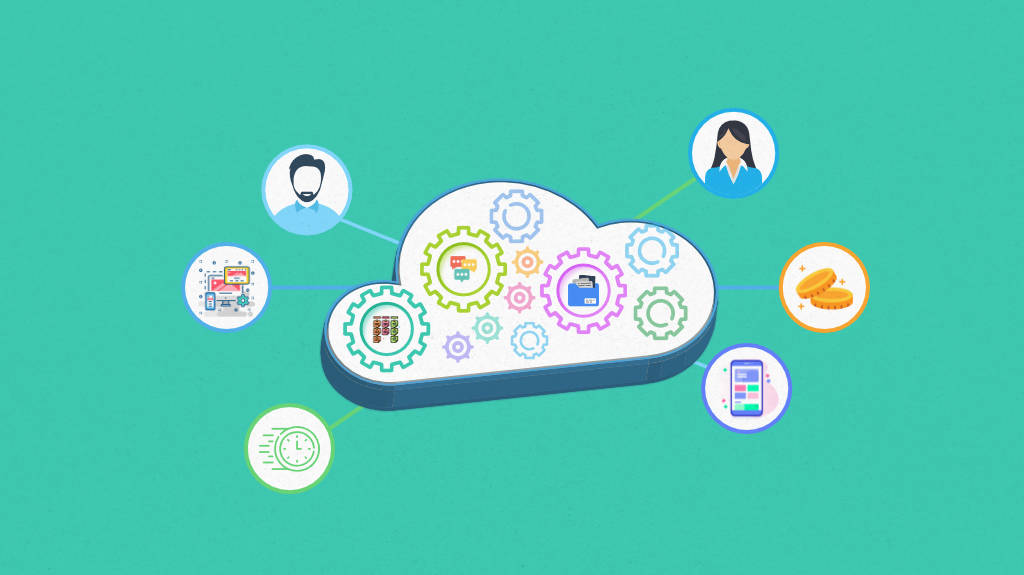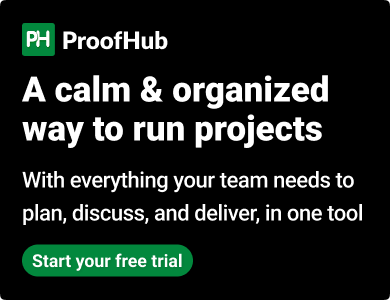Cloud-based project management software operates on remote servers managed by third-party providers rather than being installed on businesses’ computers or servers.
These powerful applications facilitate real-time collaboration, provide enhanced visibility, and offer unparalleled flexibility, allowing managers and teams to manage projects – whether at desk or on the move. Unlike on-premise solutions that demand expensive set-up and constant upkeep, cloud solutions are easy on-pocket and low-maintenance.
Getting started is as simple as having an internet connection and a subscription plan. With these in place, you can organize your workload, streamline your workflows, and scale up your operations – all while keeping your data secure.
However, before selecting a project management tool and determining the features to prioritize, it’s important to understand the distinct advantages that a cloud-based project management solution offers.
Benefits of cloud-based project management tools
A cloud-based project management software coordinates a project’s planning, collaborating, monitoring, and delivery with unmatched flexibility and efficiency. Apart from this, here are some primary benefits of using cloud project management software for your business.
1. Hassle-free setup: You do not require any rigorous training, knowledge of extra tools or installations, and extensive resources to get started with these tools.
2. Easy access: These tools provide the flexibility to access project-related information from any time, anywhere, provided you have an internet connection.
3. Cost-effective: The cloud solutions are straightforward in your pocket. You don’t need to spend heavily on buying servers, additional installations, or expensive licenses.
4. Improved communication: These solutions provide a centralized place for real-time and transparent communication, contrary to email exchanges, which confuse.
5. Low-maintenance technology: Vendors take care of any issues, upgrades, or anomalies to cloud solutions and don’t require significant effort from your end.
6. Reliable and secure: Cloud-based project management software offers several security measures, such as data segregation, SSL certificates, and more robust encryption protocols to protect data.
7. Allows web-based integrations: Many cloud-based tools offer the flexibility to integrate with a plethora of applications and services to enhance their functionality.
8. Better remote collaboration: Cloud-based tools allow cross-functional and decentralized teams to collaborate, share information, and access critical documents despite the location and time zones.
9. Scalable: Cloud-based project management software scales with your growing needs and requirements without requiring significant investments in your infrastructure.
10 best cloud project management software
Here is a compiled list of the best cloud project management software that you might want to check out.
1. ProofHub
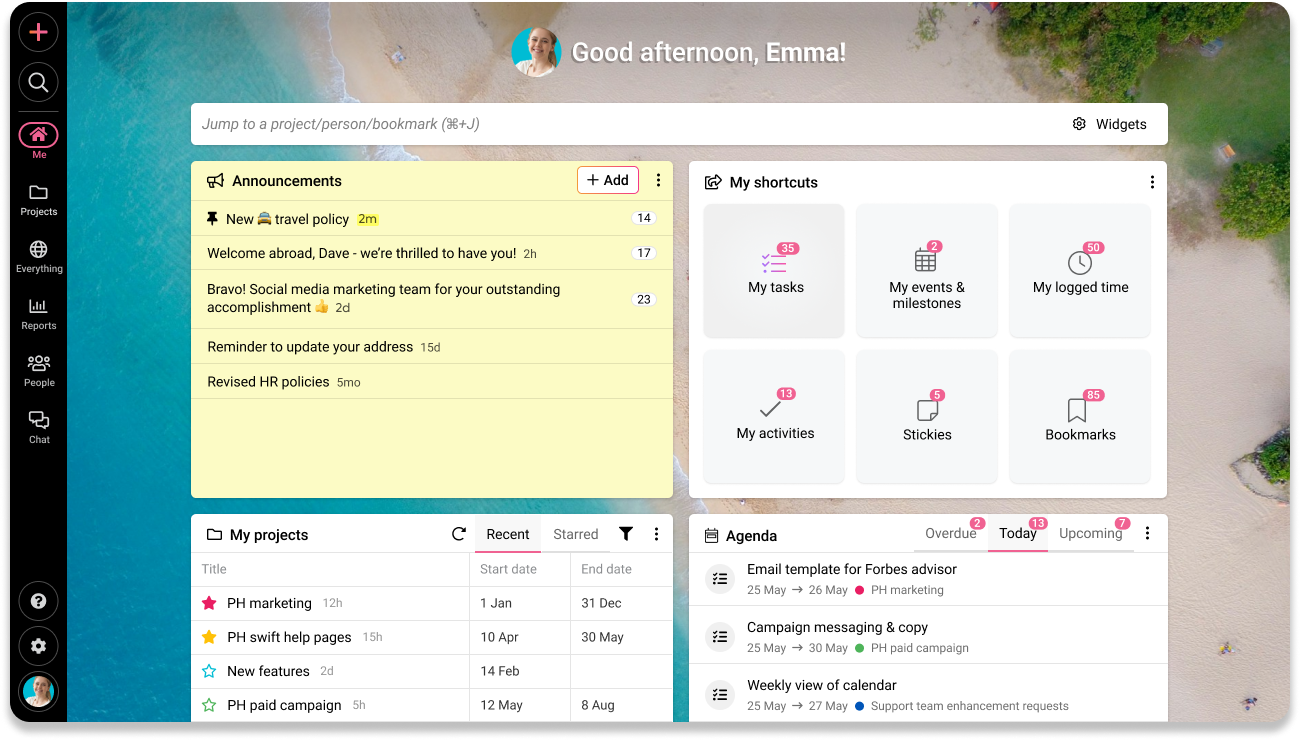
ProofHub is an all-in-one cloud-based project management software designed to assist teams in successful project planning and execution. Its intuitive and user-friendly interface ensures managers and teams stay coordinated and aligned by centralizing tasks and streamlining workflows, ensuring everyone works in alignment to achieve shared objectives.
Key features:
- Break down the project into task lists, tasks, subtasks, and milestones for granular control.
- Assign tasks, define expectations, and add due dates to enhance accountability and productivity.
- Built-in chat, discussions, mentions, announcements, and notifications to facilitate real-time communication and collaboration.
- Online proofing tool to review, annotate, and leave feedback on virtual documents.
- Visualize project dependencies and project progress to spot and eliminate bottlenecks with Gantt charts.
- Create customized workflows to match your business-specific requirements and needs.
- Generate custom or default reports to get valuable insights into team workload, resource utilization, and task status.
- Track time spent on tasks to measure billable hours and analyze team performance with the built-in tracker.
Pros:
- All-in-one platform with centralized functionality
- Intuitive and user-friendly interface with a minimal learning curve
- Highly customized platform tailored to meet varied user needs
- Scalable solution with flat-fee pricing and no-per-user fees
- Provides reliable security measures to protect data and sensitive information
- Offers multilingual support
- 24/7 customer support is available
- Caters to different time zones and languages
Cons:
- Not ideal for freelancers and individual users
- No free version, however, you can avail of a 14-day free trial.
- Pricing: ProofHub offers a 14-day free trial along with the following two flat-fee pricing plans:
- Essential: $45 per month (on annual billing)
- Ultimate Control: $89 per month (on annual billing)
Ratings:
- G2: 4.6
- Capterra: 4.6
2. Wrike

Wrike is a straightforward cloud project management tool to streamline work processes and manage projects. It is loaded with some useful features like task management, task prioritization, team management, interactive timeline (Gantt chart), and workload management. You can automate tasks to eliminate wasted efforts and save teams valuable time.
Key features:
- Pre-defined dashboard templates to provide real-time insights.
- Adjust deadlines and reschedule tasks in bulk with drag-and-drop on the project timeline
- Multiple task views to visualize your project workflow
Pros:
- Automation saves time and efforts
- Provides templates for several use cases
- Offers seamless integration with third-party tools
Cons:
- Time tracking and timesheet features are available only in high-tier plans
- Only a Pinnacle plan user can define job roles
- The maximum limit to no. of users for the Team plan is 25, and the Business plan is 200
Pricing:
- Free to get started
- Team: $9.80/user/month when billed yearly
- Business: $24.80/user/month when billed yearly
- Enterprise: Contact team for Enterprise-grade security
- Pinnacle: Contact team for advanced features
Ratings:
- G2: 4.2
- Capterra: 4.3
Is Wrike not satisfying your needs? Check out our list of best Wrike alternatives
3. Planview AdaptiveWork
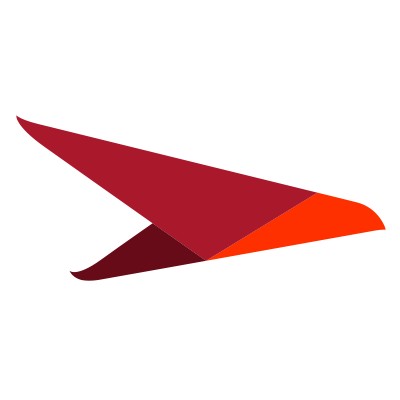
Planview AdaptiveWork, formerly known as Clarizen, is a project management software with a key focus on managing project portfolios. Its intuitive reports and dashboards enhance visibility across all workstreams, ensuring no issues remain unaddressed and corrective actions are taken to improve work dynamics.
Key features:
- Build reports and dashboards to monitor progress and inform stakeholders
- Create shared workspaces, maintain version control, and visualize task progress for better collaboration
- Optimize resource allocation, prioritize projects, and track portfolio performance for better decision-making.
Pros:
- Offers demos and tutorials
- Can handle even complex portfolios
- Highly collaborative platform
Cons:
- Steep learning curve
- No transparent pricing
- Overwhelming feature set
Pricing:
One pricing plan; Book a demo or contact the team for custom pricing
Ratings:
- G2: 4.1
- Capterra: 4.3
4. ProjectManager

ProjectManager is a collaborative cloud-based solution designed for mid-sized organizations. The tool is suitable for elevating efficiency in project planning, budgeting, scheduling, tracking, execution, and reporting. The platform facilitates secure collaboration by offering custom roles, user permissions, and technical security and compliance.
Key features:
- Customizable dashboard to analyze key metrics and performance indicators
- Manage, organize, and categorize distinctive projects into categories to manage project portfolio
- Create task lists, manage tasks, and visualize workflow across multiple project views
Pros:
- Native time tracking
- Comprehensive training resources available
- You get unlimited file storage in the Enterprise plan
Cons:
- The team plan can accommodate only 10 users
- Expensive compared to other tools
- Complex when it comes to advanced functionalities
Pricing:
- Team: $13 per user per month on annual billing
- Business: $24 per user per month on yearly billing
- Enterprise: Contact the sales team for advanced features
Ratings:
- G2: 4.4
- Capterra: 4.1
5. Zoho Projects
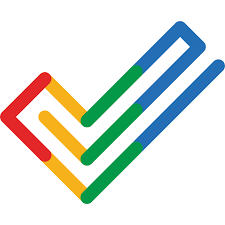
Zoho Projects is a cloud-based project management platform designed for end-to-end work management. It helps you plan projects, manage tasks, track time, measure progress, collaborate with teams, and do much more in one place. With Zoho Projects, teams can get more work done and deliver on time, all at a reasonable price.
Key features:
- Automate routine tasks by designing a blueprint.
- Get visibility into team workload to avoid overload and ensure fair distribution.
- Basic and advanced reports to analyze various parameters and optimize performance.
Pros:
- Offers several in-house and third-party integrations
- In-house project time tracker
- Template library to suit diverse needs
Cons:
- Limited customization options
- Only Enterprise plan users can add custom fields
- Advanced features like critical path and custom roles are limited to high-tier plan
Pricing:
- Free: Free for up to 3 users
- Premium: $4/user/month if billed yearly
- Enterprise: $9/user/month if billed yearly
Ratings:
- G2: 4.3
- Capterra: 4.4
Is Zoho adding to your complexities? Discover the best Zoho alternatives
6. Smartsheet

Smartsheet is a popular cloud-based project management tool with an Excel-like interface. The highly customizable solution provides several functionalities to manage projects and portfolios. Its workload tracking feature helps you uncover resource availability and performance issues for optimized team efficiency.
Key features:
- Store files, images, docs, videos, and rendering for seamless data management.
- Multiple project views to visualize project timelines and manage workflow.
- Share files, add attachments, and provide updates for enhanced collaboration.
Pros:
- Both iOS and Android apps are available
- Suitable for teams accustomed to spreadsheet-like layout
- Smartsheet community and learning resources to assist new users
Cons:
- Complicated user interface
- You can access online proofing only in high-tier plans
- No more than 250 automation actions are allowed in the pro plan
Pricing:
- Pro: $9 per member/month on annual billing
- Business: $19 per member/month on annual billing
- Enterprise: Contact team for advanced security and controls
Ratings:
- G2: 4.4
- Capterra: 4.5
Explore the best Smartsheet alternatives to avoid overwhelm and boost productivity
7. Trello

Trello is a visual project management tool known for its Kanban-style approach to managing projects. It follows a three-hierarchy structure – boards, lists, and cards to organize work and streamline tasks. The user-friendly interface makes it easy to visualize timelines, track progress, and manage workloads for teams of all sizes.
Key features:
- Automate recurring tasks and workflow with Butler automation
- Centralize task information, including team members, due dates, and attachments in cards
- Ready-to-use templates for different categories
Pros:
- Highly intuitive and customizable platform.
- Offers no-code automation.
- Effective Kabna solution to project management.
Cons:
- Offers no dedicated collaboration features.
- Depends on power-ups for task dependencies.
- No native support for task reporting.
Pricing:
- Free: Free for up to 10 boards
- Standard: $5 per user/month if billed annually
- Premium: $10 per user/month if billed annually
- Enterprise: $17.50 per user/month if billed annually
Ratings:
- G2: 4.4
- Capterra: 4.5
Is Trello not meeting your expectations? Discover the best Trello alternatives for full-fledged project management practices
8. Teamwork
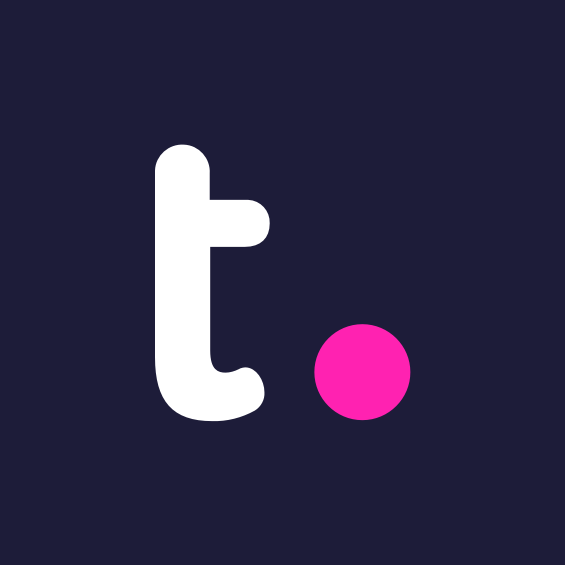
Teamwork is a simple yet powerful cloud project management software designed for organization and efficiency. If you are a client-handling organization, you will love its collaborative platform. From handling project portfolios to balancing team workload, teamwork.com streamlines client communication and optimizes project delivery to ensure your profit margins grow.
Key features:
- Burndown reports for visualizing completed and remaining tasks
- Visualize task progress, status, and timeline through multiple task views
- Workload planner to manage team capacity and prevent burnout
Pros:
- Simple and intuitive interface
- Mobile and desktop apps available
- Offers built-in billing and invoice calculations
Cons:
- Limited visibility into team workload in the Deliver plan
- Count limit on automation actions
- Advanced reporting is accessible in high-tier plans
Pricing:
- Deliver: $10.99/user/month (billed annually)
- Grow: $19.99/user/month (billed annually)
- Scale: $54.99/user/month (billed annually)
- Enterprise: Contact the team for details
Ratings:
- G2: 4.4
- Capterra: 4.5
Discover ProofHub vs Teamwork comparison to find out the best one for your needs
9. nTask
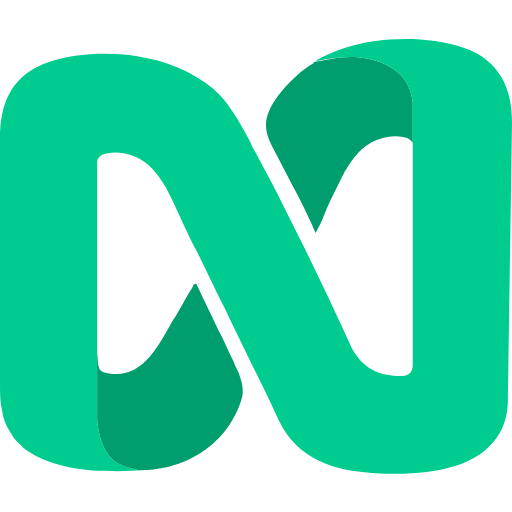
nTask is a popular cloud-based project management tool with impressive functionalities. The user-friendly interface simplifies everything from project planning to project execution, whether simple or complex. You can create custom workflows, create to-do lists, and assign tasks to ensure everyone understands project objectives and expectations.
Key features:
- Collaborate in real-time through chats, file sharing, and updates.
- Gantt charts to visualize task dependencies and progress.
- Track team member hours using a time tracker or add manual time estimates.
Pros:
- Extensive free plan with essential features
- Provides 24/5 chat support
- Affordable software solution
Cons:
- Free plan is limited to 5 people
- Features like reporting and risk tracking are available in advanced plans
- Fewer customization options are available
Pricing:
nTask offers four plans:
- Basic: Free
- Premium: $3/month on yearly billing
- Business: $8/month on yearly billing
- Enterprise: Contact team for enterprise-grade features
Ratings:
- G2: 4.4
- Capterra: 4.2
10. GanttPRO

GanttPRO is one of the best cloud Gantt chart tools for project management. You can use it to create tasks, define deadlines, and establish dependencies for effective project planning and scheduling. Along with its ability to synchronize in real-time, the tool offers critical path highlighting to avoid any delays and stay on track.
Key features:
- Offers Cascade sorting to sort your Gantt chart
- Convert project into tasks, subtasks, and define dependencies
- Account role to define user permissions as an Owner, Admin, or Member
Pros:
- Intuitive user interface
- iOS and Android apps available
- Provides pre-figured templates to get started in no time
Cons:
- Can be expensive for small and medium-sized organizations
- No advanced reporting capabilities
- Limited customization options compared to other tools
Pricing:
- Basic: $7.99 per user per month (if billed annually)
- Pro: $12.99 per user per month (if billed annually)
- Business: $19.99 per user per month (if billed annually)
- Enterprise: Contact the team for details
Ratings:
- G2: 4.8
- Capterra: 4.8
Explore the list of the best Gantt chart tools & software to keep your team on track
Features of cloud-based project management software
With new and improved software solutions entering the market regularly, choosing cloud-project management software can often become pretty exhausting.
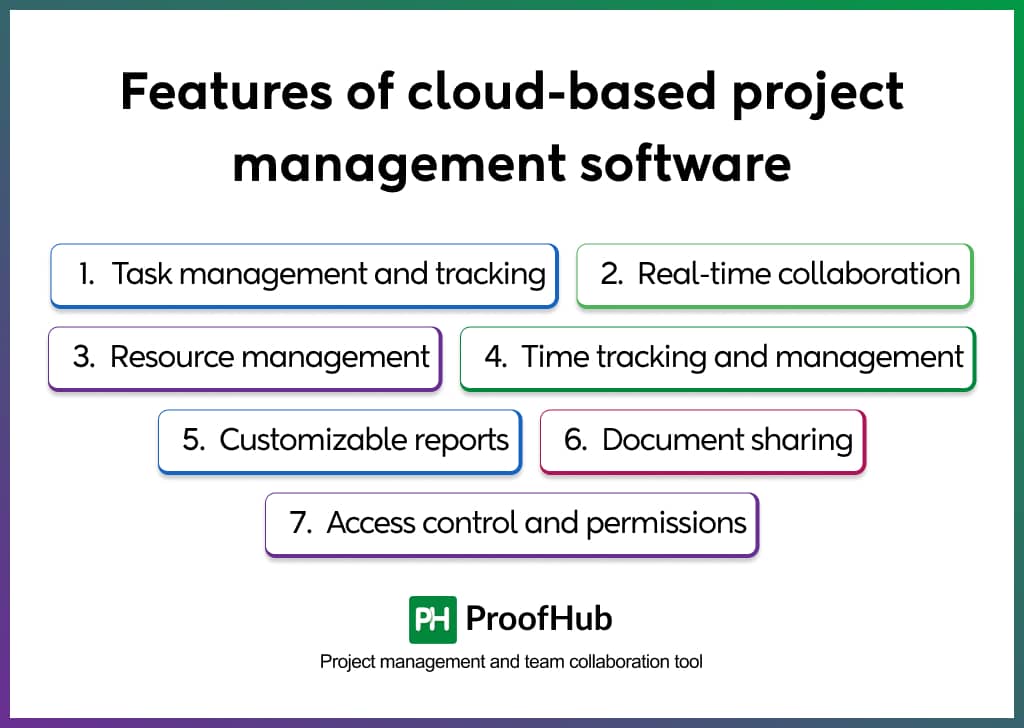
Therefore, here are some necessary features to consider when selecting the right one for your projects.
- Task management and tracking: The tool should allow you to create tasks, add due dates, define priorities, and assign single or multiple team members. Also, being able to track progress is crucial for detecting potential setbacks and addressing them before they escalate.
- Real-time collaboration: You should be able to communicate in real-time, share updates and information, and collaborate seamlessly with the cloud solution. This ensures everyone in your team is aligned with the overall objectives.
- Resource management: Look for cloud-based solutions that offer enhanced visibility into resource workload, capacity, and inefficiencies for optimal resource allocation and utilization. The practice enhances your team’s accountability and productivity.
- Time tracking and management: With cloud project management software, you should be able to compare estimated time with actual time spent on tasks to evaluate team performance. Also, you can use timesheets to track billable and non-billable hours for billing and invoicing.
- Customizable reports: The cloud solution should help you generate default and custom reports on project progress, resource utilization, time utilization, and more. This allows you to strategize better and make decisions for optimal performance.
- Document sharing and management: One should be able to share files and proof documents, as well as access up-to-date information with cloud solutions. It should create a central repository to manage all your information, document-versions, and communication, eliminating the scope for confusion and misunderstanding.
- Access control and permissions: With the cloud project management solution, you should be able to define user roles and permissions to limit access to authorized personnel. This enhances security and confidentiality, allowing team members to see only the information relevant to their roles.
What is the difference between cloud-based and on-premise project management software?
The fundamental difference between cloud-based and on-premise software is in the software’s location of installation and method of deployment.
A cloud-based project management software is hosted on the provider’s server and runs through a web browser. You can use them to plan, organize, and manage projects from anywhere, as long as you have access to an internet connection. These solutions are great for organizations with dispersed workplaces, as flexibility and scalability are the core aspects of this software.
On the contrary, on-premise software is installed on the organization’s hardware infrastructure and accessed through local networks. It provides greater control to organizations at the cost of high upfront investments. Regardless, the software ensures greater security measures compared to cloud solutions, where any security breaches may make your data vulnerable to external threats.
